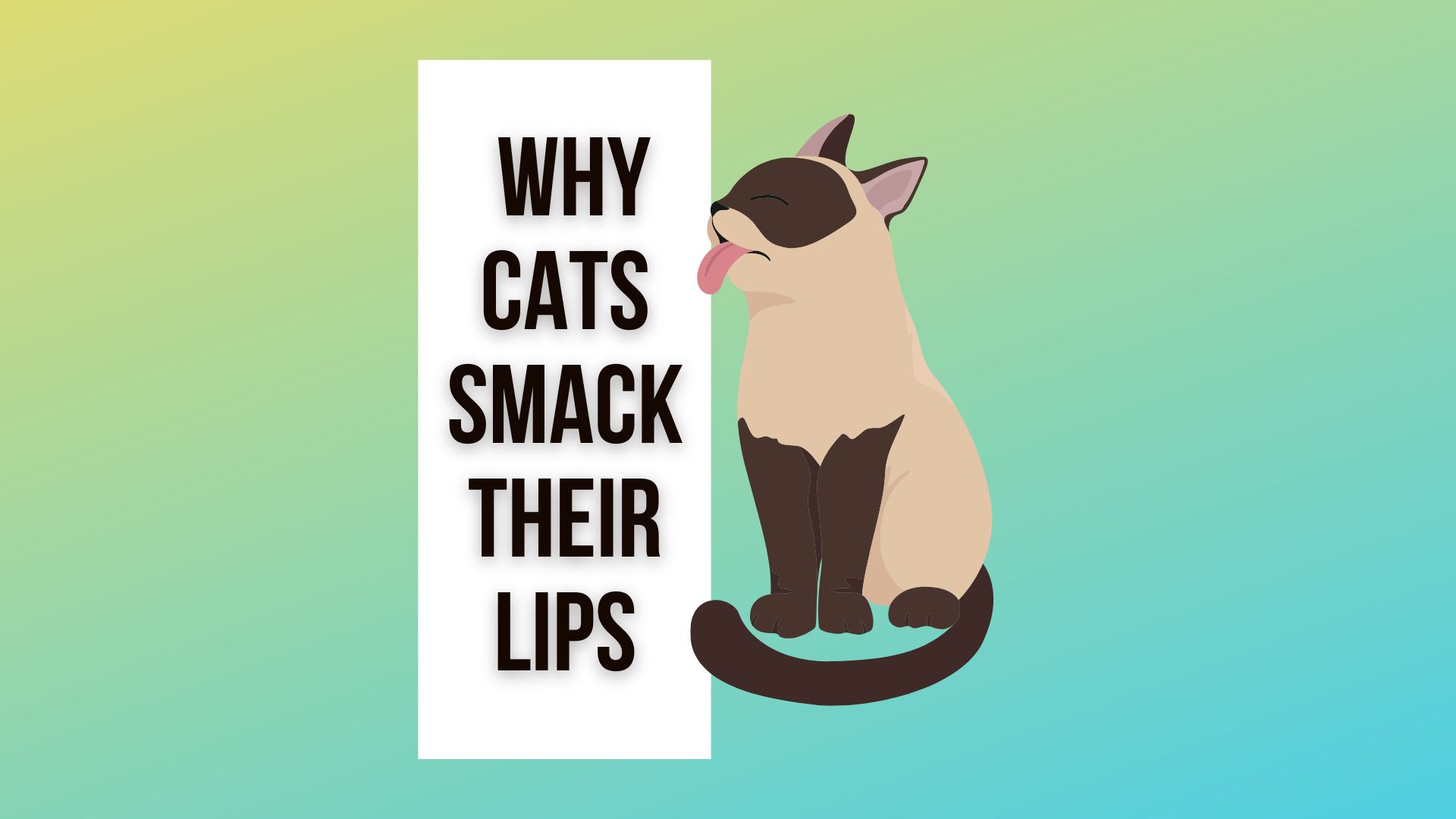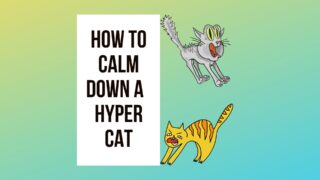
Why Is My Cat Licking Her Lips All The Time? What Does it Mean When Your Cat Is Smacking its Lips?
Cats regularly groom themselves at some point of the day, and licking their lips is ordinary conduct after a fulfilling meal. However, immoderate lip-smacking may be a result of a scientific problem or behavioral problem requiring a vet visit.
Closely tracking your feline’s everyday routine and noting any additional signs is essential to understanding the reason for the conduct.
Cats might also additionally cry out while they are not feeling healthy. However, they basically use body language to speak about any issues to their owners.
If your feline is licking its lips too much, this article allows you to have a look at those possible reasons that will help you decide the source of the behavior.
Cats Smacking Their Lips? 13 Reasons Explained
1) Your feline just had her food
You will notice that your feline will smack her lips after she finishes consuming her food.
If you think about it, that is no different from what human beings do after ingesting a meal, right? Your feline will smack her lips to get the relaxation of the meals out of her mouth.
Dry cat meals can get caught in and around your feline’s teeth.
Wet cat meals are much less of a mess. However, you may see that there are meals stuck in your feline’s lip and chin. Smacking her lips is simply one of the last methods your feline can clean herself up.
2) Feline Displacement Behavior
This suggests anxiety in felines. Some felines smack or lick their lips while they’re traumatic, anxious, and/or under stress. This is mainly true for kittens or younger cats.
For example, while you’re taking your kitten to the vet, even for an ordinary checkup, they’ll get anxious and begin smacking their lips a lot. This is a clear indication that your furball is getting traumatic and desires to run away.
3) Dental Disease in Cats ( Cat’s Teeth Problems)
Felines with dental disorders and/or oral infections also can indulge in immoderate lip smacking. As dental disorder advances, plaque turns to tartar.
The build-up of tartar above and below the gum line can gradually produce an environment for bacteria to develop that is detrimental to the periodontal tissues. Many felines can even not consume well, lose weight, and/or drool.
4) Your Cats Mouth is Dry
If your furball appears to have trouble swallowing and often licks its lips, it could be because of a dry mouth.
Over time, particles and fur can build up on the feline’s tongue and develop hairballs.
Dry mouth can be a temporary circumstance caused by a fever or dehydration that may be treated to return saliva to normal.
5) Medicines After Effects
Medications such as diuretics, antihistamines, decongestants, anesthetics, and sedative agents can also dry out a feline’s mouth. After a vet examines your furball, they will suggest:
- Using water components to prevent infections
- Daily brushing
- Administering pilocarpine to boom saliva production
- Using mouthwash
- Serving moisture-rich meals
6) Ptyalism/Over Saliva Secretion
Ptyalism is also referred to as hypersalivation. It is the immoderate production of saliva. There are numerous reasons for hypersalivation, and it may be an indication of a much more severe problem.
Usually, felines resort to lip-smacking to eliminate the extra drool. Ptyalism can cause vomiting, nausea, and kidney diseases.
7) Stress And Anxiety In Cats
Excessive lip-smacking might be because your feline is experiencing these feelings along with different signs.
Noticing those signs along with new immoderate behavior, like lip-smacking, is step one closer to a stress-free kitty.
Therefore, you can attempt using calming cat pheromones with your stressful feline.
8) Insect Bites and Irritation in Skin
Any sort of bite on the face or across the lips can cause lip-smacking. Bites can arise from other spiders, cats, mosquitos, horse flies, and stings that can be caused by bees or wasps.
Snakebites can arise across the face and mouth and cause swelling, pain, discharge, or lip licking.
9) Compulsive Disorders
Some felines can also additionally lick their lips excessively from obsessive-compulsive disorders.
It is common, however, that felines with compulsive disorders will lick their fur.
10) Oral Ulcers
Similar to dental problems, oral ulcers can be painful. The ulcer infection across the feline’s mouth results in lip-smacking in felines.
Apart from lip-smacking, you could additionally see immoderate swelling around their mouth.
11) Unique Tastes
Cat lip-smacking isn’t always an extreme problem, and regularly it happens whilst your feline tastes something unique. In fact, felines are natural lickers.
If they lick a floor after it has simply been washed or on the unclean ground, numerous natural and environmental factors can depart a strange or nasty flavor in their mouth, and they may smack their lips.
12) Nauseous Cat
Cat smacks his lips when he’s feeling nauseous.
You may have read that cats can’t vomit, but on rare occasions when they’re feeling nauseous and unable to throw up, lip-smacking might help.
If your cat is feeling nauseous, he may not want to be active. He might also go back and forth from the litter box. However, It is not possible to give a cat an antacid.
Groom your cat, make sure he has water on hand, and give him a cool place to rest. These tips will help you to make him feel better.
13) Something Stuck In Cat’s Teeth or Mouth
Your cat will be smacking his mouth around due to having dry food stuck between their teeth.
Lip-smacking is usually a sign that your pet has something edible in their mouth, but wet food may also lead to an inability to remove the tasty item.
Just like humans, cats’ tongues can’t move around the inside of their mouths easily, so they smack their hungry mouths back and forth until the food falls out

Help! How to Calm Down A Crazy Hyper Cat
Cat Smacking Lips. Is It Normal?
Felines’ lip-smacking sometimes is very normal. It is a behavior most customarily visible after the consumption of food. However, it can additionally be an indication of health issues.
If you observe your feline is lip-smacking greater than typical, seek advice from a veterinarian and they’ll be capable of advising you on the purpose and what to do.
Cat Smacking Lips While Sleeping
Feline lip-smacking during sleep can be caused by a dry mouth or by dreaming. If your feline is only smacking their lips while they’re sleeping it’s far nothing to fear about.
Cat Smacking Lips And Not Eating
Felines that are feeling nauseous can clearly refuse to consume or not venture in the direction of their typical feeding stations. Or they can lick their lips often or swallow frequently or swallow effortfully.
Cat Smacking Lips After Eating
It is common for felines to smack their lips after consuming. Also, it is usually not a problem as they’re just tasting meal remnants.
Felines produce more saliva while they’re consuming to help aid ingestion and prevent dryness.
Therefore, this growth in saliva production can cause the felines to smack their lips after the meal too.
Cat Smacking Lips And Swallowing
Felines that are dehydrated or nauseated can excessively lick or smack their lips.
Many times, felines may even drool and vomit following lip-smacking behavior.
Cat Smacking Lips And Foaming
Drooling and foaming can be a response to toxin ingestion and are probably accompanied by nausea and vomiting.
Many household merchandises are dangerous, and even a few pet merchandise can cause reactions in case your feline is highly sensitive to the product or in case you use it incorrectly.
Cat Smacking Lips When Happy
If your feline smacks its lips while purring, it typically is not something to fear about.
In fact, Purring is usually a satisfying signal and when felines are satisfied they may drool more than every day. Also, it causes lip-smacking in felines.
My Cat Lick Her Lips At Me When I Talk To Her
The most common reason felines lick their lips is for post-meal grooming.
The conduct is based on a feline’s instinct to cast off scent traces after devouring prey.
Leftover scents might be detected by different prey and alert them that the cat predator is in the area.
Do cats lick their lips when in pain?
If your feline has an upset stomach, it would cause this conduct. Often, while a cat is not feeling the greatest, it might lick its lips as a signal of pain and irritation.
If this is regularly occurring because of nausea, there may most probably be an underlying cause. Cats aren’t supposed to be nauseous all the time.
Do cats lick lips when hungry?
If you are an obsessive feline proprietor like I am you could clearly tell the distinction between a cat that is licking his lips to suggest that he is hungry, or cleansing his face, to this sort of licking, which shows something’s incorrect with his stomach.

Hi, This is Alexa, and I love cats. This Website is a Complete Journal about how to travel with a cat and other information about Cat Health, Cat Training, Cat Behavior, Cat Foods and more. I hope you find it useful.
